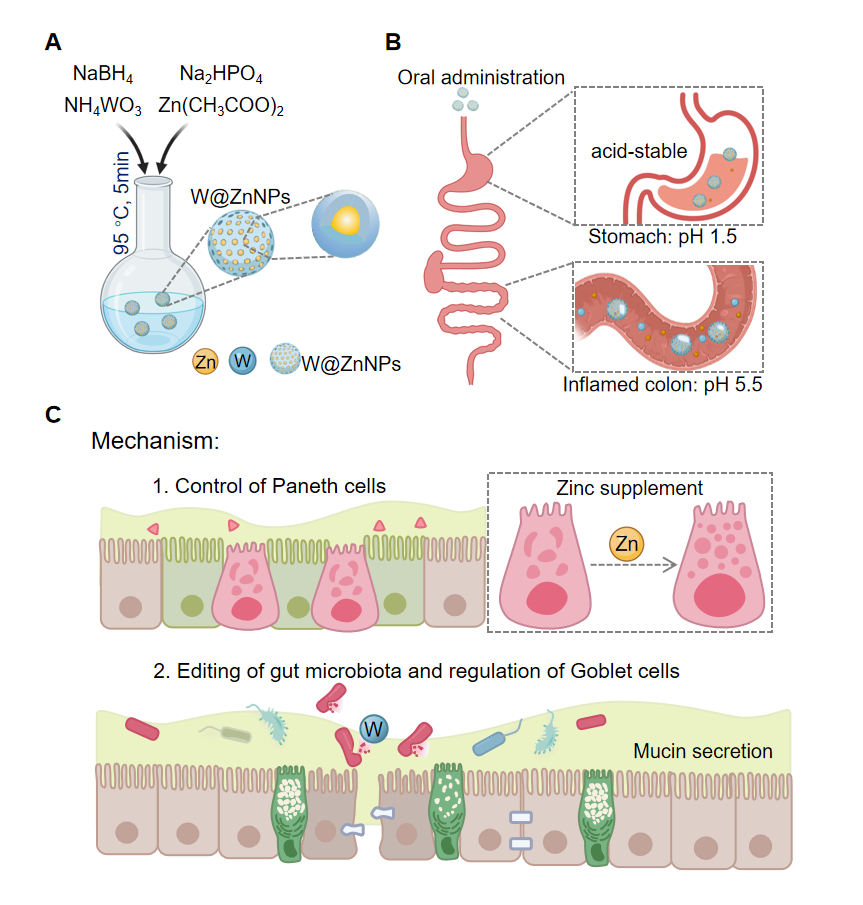From the iron in our blood to the zinc in our cells, metals shape human health in profound ways—yet their dual nature is a paradox. While essential elements like copper and sodium sustain life, toxic counterparts such as lead or mercury threaten it. The gut, a bustling hub of metal absorption and microbial activity, teems with trillions of bacteria whose behavior is swayed by these elements. Recent studies, like a groundbreaking 2018 Nature paper, found tungsten can calm gut inflammation by altering bacterial metabolism—but its toxic buildup in organs casts a shadow. Zinc, crucial for immunity, turns foe in excess, eroding gut defenses. Striking this delicate balance—harnessing metals’ power without harm—fuels today’s biomedical quests.
Addressing this challenge, a team led by Profs. NIE Guangjun and ZHAO Ruifang at the National Center for Nanoscience and Technology (NCNST) developed tungsten-encapsulated zinc NPs (W@Zn NPs) using a single-step chemical synthesis. The W@Zn NPs exhibit good stability in the stomach’s acidic environment, enabling targeted release at inflamed intestinal sites. By adhering to the mucus layer, these nanoparticles enhance local interactions with gut microbes while minimizing systemic distribution, thereby boosting both efficacy and safety. The research is published on Matter.
Inflammatory bowel disease (IBD), a chronic, incurable condition, arises from complex interactions between genetics, immune dysfunction, and environmental triggers. Current therapies, which primarily suppress hyperactive immunity, fail to address root causes like gut barrier damage, microbial imbalance, and mucosal immune dysregulation. The NCNST team’s strategy tackles these multifaceted issues simultaneously: zinc acts as a nutrient to repair the intestinal barrier and stimulate anti-inflammatory proteins like metallothionein, while tungsten selectively curbs pathogenic Enterobacteriaceae overgrowth during inflammation.
Notably, zinc deficiency—common in IBD due to malnutrition and microbial competition—is mitigated through the nanoparticle’s controlled release, supporting Paneth cell function (key players in gut immunity). Meanwhile, tungsten’s microbiota-modulating effects are confined to the gut lumen, avoiding systemic toxicity. This dual-action strategy not only alleviates acute colitis in preclinical models but also establishes a framework for bidirectional gut-body-microbiome regulation.
Professor NIE, co-lead of the study, emphasized the work’s broader implications,“By integrating metal biology with nanotechnology, this research suggests new pathways to address complex conditions like IBD. It highlights how precision-engineered therapies could help restore gut balance while minimizing risks, potentially inspiring safer, smarter strategies for modulating the microbiome.”

Schematic illustration of W@Zn NPs for preventing and treating inflammatory bowel disease (Image by the research group).
Contact:
NIE Guangjun
National Center for Nanoscience and Technology (NCNST)
E-mail: niegj@nanoctr.cn




